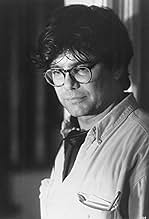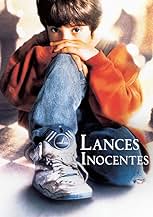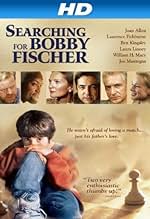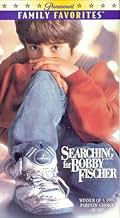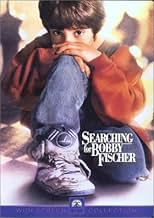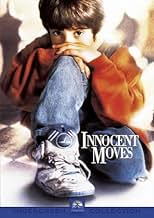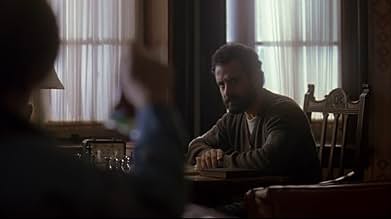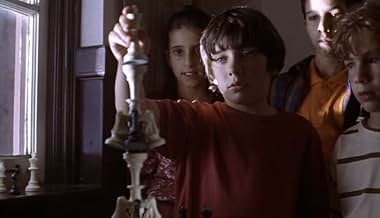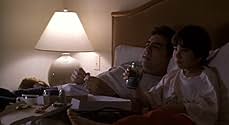Un prodige des échecs prépubère refuse de s'endurcir pour devenir un champion comme le célèbre mais peu aimé Bobby Fischer.Un prodige des échecs prépubère refuse de s'endurcir pour devenir un champion comme le célèbre mais peu aimé Bobby Fischer.Un prodige des échecs prépubère refuse de s'endurcir pour devenir un champion comme le célèbre mais peu aimé Bobby Fischer.
- Réalisation
- Scénario
- Casting principal
- Nommé pour 1 Oscar
- 6 victoires et 11 nominations au total
Avis à la une
***SPOILERS*** The movie "Searching for Bobby Fischer" parallels the lives of Grand Chess Master Bobby Fischer with that of young seven year-old chess prodigy Josh Waitzkin, Max Pomeranc. The movie does it by inserting newsreel footage of Bobby winning the World Chess Championship Tournament in Reykjavik Iceland back in 1972 against the Soviet Unions Boris Spassky. It then jumps back to when Bobby Fischer was a young boy, and man, in the 1950's and 1960's as his obsession with chess brought him the fame and glory that he sought. Yet at the same time denied him the life of a normal boy growing up in post WWII America that his night and day chess fixation cost him.
Josh has lots of promise in becoming a future Bobby Fischer; he has a computer-like mind and a natural ability to foresee moves by his opponents, even before they even know that they'll make them. One thing that Josh doesn't have is that drive and determination, as well as killer-instinct, that Bobby Fisher had and as far as I know still does in playing to win and pulverizing his opponents into the ground by doing it.
Josh likes all kinds of sports, besides chess, and his dad Fred Waitzkin, Joe Mantegna, is a sports writer who takes Josh along to the Yankee and New York Mets baseball games where the young boy really has as much of a good time watching the ball games as he has playing chess. Fred realizes what a whiz his young son Josh is in the game of chess and wants to have him study the finer points of the game by hiring former national chess champion Bruce Pandolfini, Ben Kingsley, to tutor him and Bruce right away realizes that Josh has the makings of another Bobby Fischer. What does bother Bruce about Josh is his playing with the local chess hustlers like Winnie, Laurence Fishburn, in Washington Square Park in Greenwich Village. Which, in Bruce's opinion, is far to fast and doesn't give young Josh time to develop his all around concentration and understanding of the game of chess.
During the course of the movie Josh is driven relentlessly by Bruce in his attempt to mold him into another Bobby Fischer but Josh slowly starts to lose his interest in winning all the chess tournaments that he enters. The very fact of his invincibility makes Josh feel uneasy since it's always expected of him to win, like the sun is expected to rise in the morning, that there's no fun or excitement in it for him any more. Losing becomes more of a growing experience for Josh and even arouses his passions in making him feel more human. Josh is also too sensitive to beat down his opponents, like Bobby Fischer did. That later lost him the championship game against the likewise seven year-old chess phenomenon Jonathan Poe, Michael Nirenberg.
After his defeat to Jonathan Josh is looked on as if he let down all those who believed in him and at the same time he starts to get his life back together as a young boy living a normal life and not carrying the weight of the entire world of chess on his shoulders. It's during this time that the real talent that Josh had in playing chess comes up to the surface, without him being driven relentlessly by Bruce. Those untapped talents leads him to go back to playing chess, first with his friend at the park Winnie, and then working his way back in winning a number of tournaments to his becoming a top chess champion competitor. All that finally earns Josh a re-match with Jonathan for the Junior Chess Championship of the US in Chicago at the conclusion of the film.
Powerful movie and very intense for the young boys and girls in it in how they drive and push themselves to be the best at the game of chess and at the same time putting themselves in danger of sacrificing their one and only childhood to do it.
Josh Waitzkin did reach the top back then when the movie "Searching for Bobby Fischer" was made in 1993 and is still there some ten years, and dozens of tournaments, later. He did it without losing both his childhood and his kind heart and sensitivity for his fellow man by doing it.
Josh has lots of promise in becoming a future Bobby Fischer; he has a computer-like mind and a natural ability to foresee moves by his opponents, even before they even know that they'll make them. One thing that Josh doesn't have is that drive and determination, as well as killer-instinct, that Bobby Fisher had and as far as I know still does in playing to win and pulverizing his opponents into the ground by doing it.
Josh likes all kinds of sports, besides chess, and his dad Fred Waitzkin, Joe Mantegna, is a sports writer who takes Josh along to the Yankee and New York Mets baseball games where the young boy really has as much of a good time watching the ball games as he has playing chess. Fred realizes what a whiz his young son Josh is in the game of chess and wants to have him study the finer points of the game by hiring former national chess champion Bruce Pandolfini, Ben Kingsley, to tutor him and Bruce right away realizes that Josh has the makings of another Bobby Fischer. What does bother Bruce about Josh is his playing with the local chess hustlers like Winnie, Laurence Fishburn, in Washington Square Park in Greenwich Village. Which, in Bruce's opinion, is far to fast and doesn't give young Josh time to develop his all around concentration and understanding of the game of chess.
During the course of the movie Josh is driven relentlessly by Bruce in his attempt to mold him into another Bobby Fischer but Josh slowly starts to lose his interest in winning all the chess tournaments that he enters. The very fact of his invincibility makes Josh feel uneasy since it's always expected of him to win, like the sun is expected to rise in the morning, that there's no fun or excitement in it for him any more. Losing becomes more of a growing experience for Josh and even arouses his passions in making him feel more human. Josh is also too sensitive to beat down his opponents, like Bobby Fischer did. That later lost him the championship game against the likewise seven year-old chess phenomenon Jonathan Poe, Michael Nirenberg.
After his defeat to Jonathan Josh is looked on as if he let down all those who believed in him and at the same time he starts to get his life back together as a young boy living a normal life and not carrying the weight of the entire world of chess on his shoulders. It's during this time that the real talent that Josh had in playing chess comes up to the surface, without him being driven relentlessly by Bruce. Those untapped talents leads him to go back to playing chess, first with his friend at the park Winnie, and then working his way back in winning a number of tournaments to his becoming a top chess champion competitor. All that finally earns Josh a re-match with Jonathan for the Junior Chess Championship of the US in Chicago at the conclusion of the film.
Powerful movie and very intense for the young boys and girls in it in how they drive and push themselves to be the best at the game of chess and at the same time putting themselves in danger of sacrificing their one and only childhood to do it.
Josh Waitzkin did reach the top back then when the movie "Searching for Bobby Fischer" was made in 1993 and is still there some ten years, and dozens of tournaments, later. He did it without losing both his childhood and his kind heart and sensitivity for his fellow man by doing it.
This is such a great film! And there is more than one reason why I believe this.
First of all, Ben Kingsley is one of my favorite actors. And this movie(along with "Sneakers", "Death and the Maiden", "Twelfth Night", and "Sexy Beast"), really helps me believe that. And I believe that this is one of his best characters, and best films.
As far as Max Pomeranc's acting is concerned...wonderful. Even today I can't think of a kid who's had a better performance. Truly good acting. And sadly for his short lived career, I'd have to say he was in his prime there.
The creativity in this film is awesome! My favorite scene is when Bruce(Kingsley) is teaching Josh(Pomerac) the dynamics of chess, and when the camera flips back and forth between the chess pieces, each time building up the conversation, and going up the ladder of significant pieces. Powerful scene, with powerful lessons.
I also enjoy that if you don't have much of an interest in chess, that it still keeps you capitvated. I wasn't as interested in chess until I saw this movie. And I'm even more interested in film (I thought that I couldn't be more interested).
And finally...the score. I love James Horner. And this is one of the reasons why. Along with "Sneakers", "Braveheart", and many other Horner scores, I find it makes the movie that much better.
Truly a movie to remember always.
First of all, Ben Kingsley is one of my favorite actors. And this movie(along with "Sneakers", "Death and the Maiden", "Twelfth Night", and "Sexy Beast"), really helps me believe that. And I believe that this is one of his best characters, and best films.
As far as Max Pomeranc's acting is concerned...wonderful. Even today I can't think of a kid who's had a better performance. Truly good acting. And sadly for his short lived career, I'd have to say he was in his prime there.
The creativity in this film is awesome! My favorite scene is when Bruce(Kingsley) is teaching Josh(Pomerac) the dynamics of chess, and when the camera flips back and forth between the chess pieces, each time building up the conversation, and going up the ladder of significant pieces. Powerful scene, with powerful lessons.
I also enjoy that if you don't have much of an interest in chess, that it still keeps you capitvated. I wasn't as interested in chess until I saw this movie. And I'm even more interested in film (I thought that I couldn't be more interested).
And finally...the score. I love James Horner. And this is one of the reasons why. Along with "Sneakers", "Braveheart", and many other Horner scores, I find it makes the movie that much better.
Truly a movie to remember always.
10marko
It's one of the toughest jobs a father faces--how hard should you push to "make a man" out of your young son.
"Searching for Bobby Fischer" offers a gentle and unexpected answer: You should listen for your son to tell you how "manly" he wants to be. Young Max Pomeranc is letter-perfect as the chess prodigy who refuses to become ruthless despite the prodding of his father and his surrogate-father. Joe Mantegna and Ben Kingsley give moving performances as men who can be convincingly converted to the truer, sweeter morality of a young child who doesn't need to be "tough" in order to be good. Watch for an understated, underrated performance by Joan Allen as the mom. A beautifully photographed, beautifully paced drama that should reduce anyone with more empathy than a statue to heartfelt tears.
"Searching for Bobby Fischer" offers a gentle and unexpected answer: You should listen for your son to tell you how "manly" he wants to be. Young Max Pomeranc is letter-perfect as the chess prodigy who refuses to become ruthless despite the prodding of his father and his surrogate-father. Joe Mantegna and Ben Kingsley give moving performances as men who can be convincingly converted to the truer, sweeter morality of a young child who doesn't need to be "tough" in order to be good. Watch for an understated, underrated performance by Joan Allen as the mom. A beautifully photographed, beautifully paced drama that should reduce anyone with more empathy than a statue to heartfelt tears.
_Searching for Bobby Fischer_ is possessive of a certain wonderful insight; it is a film that offers no heart-warming premeses and still manages to ease the soul.
The characters dwell in an utterly contemporary world; you will find no neighbors hauling in bags of money, chiming churchbells, perfect families, or million-dollar smiles anywhere in the film. At the same time, this world of this film exhibits a resilience against its crueler realities that most of the art of the twentieth century eschewed in favor of probing the darkness of existence. Yes, the main characters are prosperous, but the spectre of Fischer hangs over the world as a daunting warning of things to come. The mood of the piece, enhanced by the excellent cinematography, sets the film up to succeed wonderfully, and the actors and text deliver.
One of the things I like the most about this movie, superficially, is that it does not insult the game of chess as it depicts it. The depiction of the chess world is insightful and accurate, from the sharp division between granite-hewn chess scholars and colorful tactical wizards to the truly unequaled awe and gravity accompanying the notion of the Grandmaster. Perhaps these are things that can only truly be appreciated by those who have ventured to this world, but, thankfully, the film integrates these elements seamlessly into a universal story that is original and poignant in its detail and elegance.
Every actor in this film is spectacular, without exception. That is a bold statement, but it is completely justified. At no point do any of the actors miss a step; all the performances are smooth and appear to be utterly effortless. In their featured roles, Ben Kingsley and Lawrence Fishburne put in performances that match in art, craft, and intensity, if not in length, any of their more prominent film roles. Joan Allen is mind-bogglingly wonderful, considering how precise she has to be to fit such a massive character into such a truncated part in the script. This is Joe Mantena's very finest performance, and, of course, this movie contains child acting to match any film ever made. Even the bit parts are acted with intensity, depth, and elegance. A lot of this is easy to miss because, on the surface, the film is so even-handed, but repeated viewings continually bring to attention wonderful nuances of these performances.
Any summary or synopsis will fail to accurately relate the "message" of this film; as in any great work of art, the quickest, most efficient way to word the resolution of the film's ideas and conflicts is to watch the film. This is where _Searching for Bobby Fischer_ really shines. There is no way these characters could have ended up where they are from any other sequence of events than the one that took place; this is a wonderful example of how a plot is woven into a story rather than imposed on it. The flipside of this is that there is extremely little to be found in this film that can be applied universally without reservation, and yet it still manages to be convincing. There is something mysterious about this movie that rises toward the staggering mysteries of life, and repeated viewings are really the only means toward a full understanding of these ideas.
Undoubtedly, this is the best film made in the 1990s based on a true story (if you, like me, discount _Schindler's List_ from such assessments. It hardly seems fair to compare _Schindler's List_ to any other film due to its unique purpose.). If you have not seen it, I highly recommend it. It may just change your life.
The characters dwell in an utterly contemporary world; you will find no neighbors hauling in bags of money, chiming churchbells, perfect families, or million-dollar smiles anywhere in the film. At the same time, this world of this film exhibits a resilience against its crueler realities that most of the art of the twentieth century eschewed in favor of probing the darkness of existence. Yes, the main characters are prosperous, but the spectre of Fischer hangs over the world as a daunting warning of things to come. The mood of the piece, enhanced by the excellent cinematography, sets the film up to succeed wonderfully, and the actors and text deliver.
One of the things I like the most about this movie, superficially, is that it does not insult the game of chess as it depicts it. The depiction of the chess world is insightful and accurate, from the sharp division between granite-hewn chess scholars and colorful tactical wizards to the truly unequaled awe and gravity accompanying the notion of the Grandmaster. Perhaps these are things that can only truly be appreciated by those who have ventured to this world, but, thankfully, the film integrates these elements seamlessly into a universal story that is original and poignant in its detail and elegance.
Every actor in this film is spectacular, without exception. That is a bold statement, but it is completely justified. At no point do any of the actors miss a step; all the performances are smooth and appear to be utterly effortless. In their featured roles, Ben Kingsley and Lawrence Fishburne put in performances that match in art, craft, and intensity, if not in length, any of their more prominent film roles. Joan Allen is mind-bogglingly wonderful, considering how precise she has to be to fit such a massive character into such a truncated part in the script. This is Joe Mantena's very finest performance, and, of course, this movie contains child acting to match any film ever made. Even the bit parts are acted with intensity, depth, and elegance. A lot of this is easy to miss because, on the surface, the film is so even-handed, but repeated viewings continually bring to attention wonderful nuances of these performances.
Any summary or synopsis will fail to accurately relate the "message" of this film; as in any great work of art, the quickest, most efficient way to word the resolution of the film's ideas and conflicts is to watch the film. This is where _Searching for Bobby Fischer_ really shines. There is no way these characters could have ended up where they are from any other sequence of events than the one that took place; this is a wonderful example of how a plot is woven into a story rather than imposed on it. The flipside of this is that there is extremely little to be found in this film that can be applied universally without reservation, and yet it still manages to be convincing. There is something mysterious about this movie that rises toward the staggering mysteries of life, and repeated viewings are really the only means toward a full understanding of these ideas.
Undoubtedly, this is the best film made in the 1990s based on a true story (if you, like me, discount _Schindler's List_ from such assessments. It hardly seems fair to compare _Schindler's List_ to any other film due to its unique purpose.). If you have not seen it, I highly recommend it. It may just change your life.
One of the best things about "Searching for Bobby Fischer" is that it brilliantly captures the essence of the book it was based on. Fred Waitzkin's book is not just about chess but focuses much on the relationship between a father and his son. The film does exactly the same and the interaction between the actors is handled skilfully by its director. This is without doubt one of the best sports movies I have seen in a while, you feel an intense level of excitement throughout the chess games and there is a great blend of poignancy, humour and serious drama also at play. Ben Kingsley is fantastic as Bruce Pandolfini and his scenes with the young Max Pomeranc are a joy to watch. Max Pomeranc who plays Josh Waitzkin is perfect in the lead role and really shows he is the heart of the movie. Adapting books to films has never been an easy task but this one is probably one of the best adaptations I have ever seen.
Le saviez-vous
- AnecdotesMax Pomeranc was chosen because he is, in real life, a chess player (or was at the time of this movie). The producers wanted someone who would be at ease and "correctly" playing chess. None of this movie's other stars played chess in the beginning, but eventually Joe Mantegna learned.
- GaffesJosh tells Vinnie he learned the "Schliemann Attack" from his teacher. Actually there's no such thing. It's the Schliemann Defense. Also, when Vinnie asks, "What's that?" referring to the "attack," Josh actually hasn't yet made the move that would prompt him to say this, he's just playing the opening move of the standard Ruy Lopez (1. ... e5), so there'd be no reason for Vinnie to say "What's that?" at that point. The move that makes it "Schliemann" (3. ...f5) hasn't yet been played.
- Versions alternativesThe original film ends with a title card stating that Josh still plays chess along with several other activities, indicating that he has a well-rounded life. When the film was broadcast on NBC in 1996, this title card was updated: it now stated that Josh was working to become a Grandmaster, and that he now considered Jack Kerouac, not Bobby Fischer, to be his primary influence.
- Bandes originalesEnough Is Enough
Written by Anthony Criss, Kier Gist, Vincent Brown, A. Bahr, J Ray
Performed by Rottin Razkals
Meilleurs choix
Connectez-vous pour évaluer et suivre la liste de favoris afin de recevoir des recommandations personnalisées
Détails
- Date de sortie
- Pays d’origine
- Langue
- Aussi connu sous le nom de
- Jugada inocente
- Lieux de tournage
- Société de production
- Voir plus de crédits d'entreprise sur IMDbPro
Box-office
- Budget
- 12 000 000 $US (estimé)
- Montant brut aux États-Unis et au Canada
- 7 266 383 $US
- Week-end de sortie aux États-Unis et au Canada
- 1 121 354 $US
- 15 août 1993
- Montant brut mondial
- 7 266 383 $US
- Durée
- 1h 49min(109 min)
- Couleur
- Mixage
- Rapport de forme
- 1.85 : 1
Contribuer à cette page
Suggérer une modification ou ajouter du contenu manquant


